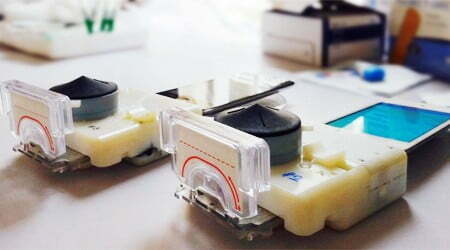
Scientists from University of Columbia, led by Samuel K. Sia, associate professor of biomedical engineering at Columbia Engineering, has developed a low-cost smartphone accessory that can perform a point-of-care test that simultaneously detects three infectious disease markers from a finger prick of blood in just 15 minutes. The device replicates, for the first time, all mechanical, optical, and electronic functions of a lab-based blood test.
All you need to do is to plugs into your smartphones. Sia’s innovative accessory or dongle, a small device that easily connects to a smartphone or computer.
Researchers have come up with “diagnosis dongle” a device which can be attached to a smartphone. It pinpricks and draws blood from the user’s finger. The blood sample is then tested and analyzed to diagnose certain diseases.
Chemical markers for HIV and syphilis change in color and opacity, if antibodies are detected in the blood sample. The device completes the diagnosis in 15 minutes and sends the data to the smartphone app.
A recent trial on 100 patients in Rwanda, found that the test was nearly as effective as a standard and clinically accurate as ELISA test for HIV.
This testing method costs merely $34 as compared to a conventional ELISA equipment can cost anywhere close to over $18,000.
The best part of it all is that even a layman can learn how to use the app in just 30 minutes.
The device can be extremely useful for people living in remote areas and with restricted access to skilled healthcare workers. Instead of travelling miles to the nearest laboratory and back later for the results, patients can get the results quickly without leaving their homes.
The device does not need the main power supply or battery. This can be a blessing in disguise in communities where power shortages are common. The power needed to carry out the test is supplied by the smartphone or computer’s audio jack- available on devices around the world.
According to World Health Organization, the estimated 35 million people living with HIV in 2003 included 3.2 million children. Most HIV infections are passed from mother to child during pregnancy and breastfeeding. However, if the infection is detected in time and the right steps are taken, the risk of transmission can be lowered to less than 5%.
Detection of syphilis infections early also leads to a dramatic 10-fold reduction in deaths.
If every smartphone user holds the power of medical diagnosis in their own hands, could this revolutionize health care provisions around the world? With just the touch of a button and a small prick to the finger, one thing’s for certain: our everyday electronic devices just became a whole lot smarter.

